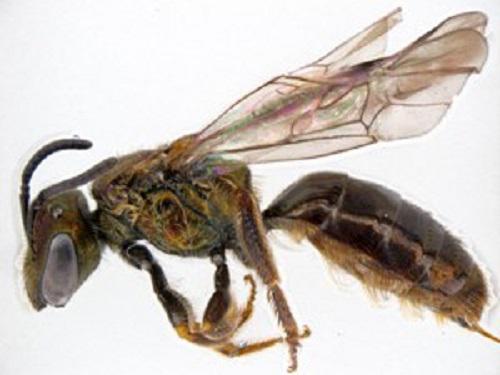Scott Vernon Charles Groom
This project provides a foundation investigation into the current status of Samoan bees, plant/bee interactions, and an approach to management of pollinators based on the long-term needs for both conservation and agriculture.

Lasioglossum (Homalictus) sp. - Bees of this genus are particularly interesting in the south western Pacific as they are small (~5mm) yet have been disperse many hundreds kilometres and colonise islands.
Despite the critical role that bees play in terrestrial ecosystems, the diversity of bee fauna in the Samoan islands is poorly understood. Native bees are not susceptible to most of the diseases of the introduced honeybee. Sustainability of ecosystem processes and security of food production in the Pacific, therefore, may rely on these species. Current estimates are that approximately 20 native bee species inhabit the Samoan islands although, as bee-focused studies within the Pacific have shown, there are potentially many more.
Our project will provide not only the current population abundance estimates, a direct measure of conservation threat that can continue to be monitored easily, but also look at genetic relationships within the Pacific to assess phylogenetic conservation priorities. Conservation phylogenetics is likely to be very important in the Pacific, given the apparently small number of bee colonisation events followed by radiations. Each colonisation will represent a rare event that captures an element of how current biodiversity was assembled. Our project will provide an enduring conservation legacy for the Samoan islands, along with wider ramifications outside this region. Project outcomes will involve:
(i) the first rigorous measurement of bee diversity in the Samoan region, allowing extinction threats to be identified and providing the basis for longer-term monitoring
(ii) an outline of the genetic framework for conservation prioritisation both in the Samoan islands and within context of other Pacific Island groups
(iii) collaboration with local experts that, through training and development of identification tools, will enable research-supported strategies in management of pollination in both conservation and agriculture.
Through understanding and monitoring bee diversity and bee ecology in the region, adaptive strategies can be applied to broad-scale impacts associated with native bee declines. Native bees provide an important role in the pollination of two of the biggest exports from Samoa; coconut products and passion fruit juice, along with other local produce crops such as coffee, papaya, mango, and nuts.
This study aims to support the sustainability of pollination as an ecosystem, and agricultural, service given an uncertain climatic future and the vulnerability of the introduced honeybee to heavy population declines.